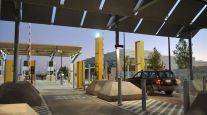Border Rail Line to Connect US, Mexico
 Metropolitan Transit System
Metropolitan Transit SystemIn a deal finalized June 9, Baja California Railroad will sublease the old and dilapidated line from Pacific Imperial Railroad, a company that has has leased the tracks from its landlord, the San Diego Metropolitan Transit District, since 2012.
The agreement cuts Pacific Imperial out of most Desert Line operations and repairs. The company has no experience running a railroad and has been the subject of a federal inquiry.
Officials said the sublease is a crucial step in getting the Desert Line running again so that products made in Mexico’s maquiladoras can be efficiently shipped into the United States by rail rather than sitting for hours in trucks at the region’s border crossings.
Between $60 million and $70 million in repairs on 70 miles of track, 57 bridges and 17 tunnels are needed before freight is moved. The two rail companies will pay for the renovations.
“Our existing freight corridors are strained, and the bottlenecks at our commercial ports of entry cause unpredictable wait times for truckers,” Jerry Sanders, CEO of the San Diego Regional Chamber of Commerce, said at a news conference announcing the agreement. “The rehabilitation of the cross-border railroad provides a much needed alternative for moving goods through one of the most vibrant centers of commerce in the world.”
Deadlines for repair and operational milestones that Pacific Imperial was supposed to meet have been pushed back a year, marking another in a series of delays that have hindered progress on the Desert Line.
A 10-mile stretch from Coyote Wells to Plaster City in Imperial County now is supposed to be repaired by March and begin limited operations by the end of next year. The 60-mile span from Division near the border to Coyote Wells now must be repaired by April 15, 2018, begin limited operations by Aug. 15, 2018, and complete full-scale repairs by Dec. 21, 2018.
Paul Jablonski, CEO of MTS, wrote in a memo that the extension is reasonable but gave no explanation. MTS has hired Rail Pros, a railroad engineering and construction management firm, to inspect the repairs.
Baja Rail already has repaired the Mexico Line, a 40-mile stretch of track that connects with U.S. trains in Tijuana and heads east to Tecate before crossing the border and connecting with Desert Line. The Mexico Line is ready to start moving goods from maquiladoras toward the United States but still lacks a station where freight can be loaded from trucks onto train cars, Baja Rail President Fernando Beltran said.
San Diego City Councilman David Alvarez, who has criticized Pacific Imperial in the past, said Baja Rail’s work in Mexico makes him optimistic that the freight line will be repaired and running soon.
“I have personally seen the work performed by the new partner, Baja Rail, on the Mexican side and was reassured by them and MTS staff that the new milestones will be met and the line will be operating in the next two years,” he said.
Joe Kasper, chief of staff for Rep. Duncan Hunter (R-Alpine) said the deal is just another delay in the Desert Line saga with no sign of work, and no real leadership.
“So here we are again. Another year, another deal, and MTS has nothing to show as evidence of progress. If anything, MTS is taking steps backwards without ever taking a step forward,” Kasper said.
Hunter is a member of the House Transportation and Infrastructure Committee. In October 2014, he asked the U.S. Attorney to investigate the Desert Line and the transit system’s lease with Pacific Imperial. Hunter and former Pacific Imperial executives accused the rail company of falsifying and misrepresenting its assets in order to lure investors, and of mismanaging funds. MTS said it looked into Pacific Imperial but did not find fraud.
The sublease divides responsibility of the Desert Line into two sections. The eastern portion runs approximately 60 miles from the border just east of Campo to Coyote Wells, which can handle trains of up to 30 cars, will be repaired and operated by Baja Rail. Construction on this span is expected to begin this summer.
Near the eastern terminus, Pacific Imperial will build a facility to load truck freight onto rail, and assemble trains with as many as 100 cars. From this hub, trains will run on a 10-mile stretch repaired and operated by Pacific Imperial with Baja Rail’s help and then connect to the Union Pacific Railroad in Plaster City, the end of the line.
Therea lso are plans for an international security checkpoint near the border, but details have not been determined, Roberts said.
Pacific Imperial signed a 99-year lease with MTS in 2012 and has been in discussions with Baja Rail since 2013. Since acquiring rights to the property, Pacific Imperial has done some tests and preliminary work. It has not done major construction or rehabilitation of the rail line.



